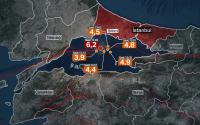17 June 2005StartribuneJuliet Eilperin
Bush administration officials have succeeded in weakening a proposal for action by the eight major industrialized nations to curb climate change.
Under U.S. pressure, negotiators in the past month have agreed to delete language that would detail how rising temperatures are affecting the globe, set ambitious targets to cut carbon dioxide emissions and set stricter environmental standards for World Bank-funded power projects, according to documents obtained by the Washington Post. Negotiators met this week in London to work out details of the document, which is slated to be adopted next month in Scotland at the Group of Eight's annual meeting.
The Bush administration contends that mandatory carbon dioxide cuts are unnecessary. Under mounting international pressure to adopt stricter controls on heat-trapping gas emissions, Bush officials have consistently sought to modify U.S. government and international reports that would endorse a more aggressive approach to mitigating global warming.
The wording of the document will help determine what, if any, action the G-8 countries will take as a group to combat global warming. Every member nation except the United States has pledged to bring its greenhouse gas emissions down to 1990 levels by 2012 as part of the Kyoto Protocol, an international treaty, and British Prime Minister Tony Blair -- who currently heads the G-8 -- is trying to coax the United States into adopting stricter climate controls. The other G-8 members are Canada, France, Germany, Italy, Japan and Russia.
In preparation for the summit, negotiators are trying to work out the wording of statements on climate change and other issues that leaders of all eight nations are willing to endorse. The language is not final, but the documents show that a number of deletions have been made at U.S. insistence.
One deleted section, for example, initially cited "increasingly compelling evidence of climate change, including rising ocean and atmospheric temperatures, retreating ice sheets and glaciers, rising sea levels, and changes to ecosystems." It added: "Inertia in the climate system means that further warming is inevitable. Unless urgent action is taken, there will be a growing risk of adverse effects on economic development, human health and the natural environment, and of irreversible long-term changes to our climate and oceans."
Instead, U.S. negotiators substituted a sentence that reads, "Climate change is a serious long-term challenge that has the potential to affect every part of the globe."






